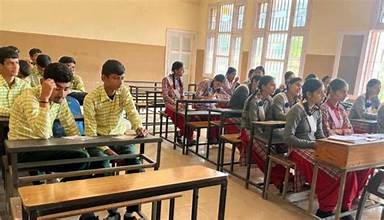Himachal Pradesh is at a critical juncture in its education system, facing a concerning decline in student enrolment alongside the need for comprehensive reforms. The state is tackling the dual challenges of reversing this trend and modernizing the outdated board examination system to align with contemporary educational objectives. To address these issues, the government is focusing on enhancing governance and creating strategic reform plans.
Current Enrollment Trends in Himachal Pradesh
The decline in student enrolment, particularly in government schools, is a significant issue. According to the UDISE+ report for 2023-24, government primary schools, which account for 80% of the total schools in the state, now enroll only 54% of students—a sharp drop from 89% in 2003-04. This trend extends to the upper primary, secondary, and senior secondary levels, indicating a growing preference for private schools, seen as offering higher-quality education.
Several factors contribute to this decline, including a decreasing school-age population, migration to private institutions, and socio-economic changes. The Total Fertility Rate (TFR) has dropped from 1.9 in 2008 to 1.7 in 2021, signaling fewer children entering the education system. Additionally, many parents prefer private schools due to their perceived higher quality, further impacting government school enrolments.
Governance Challenges in Education
The declining enrolment numbers create governance challenges, particularly regarding resource allocation. Many government schools are operating below capacity, leading to inefficiencies and increased per-student expenditure without corresponding improvements in educational outcomes. Despite favorable pupil-teacher ratios (11.70 in government schools versus 14.33 in private schools), learning outcomes remain subpar. Furthermore, schools with low enrolment struggle with maintaining infrastructure, adding to the financial burden.
Addressing Educational Reforms
In response to these challenges, the Himachal Pradesh government has launched an ambitious initiative to improve educational standards across the state. The government aims to establish Schools of Excellence to set new benchmarks in education. These institutions will focus on providing quality education through innovative teaching methods, highly trained teachers, and curricula emphasizing critical thinking, creativity, and problem-solving skills.
Transforming Education: Rajiv Gandhi Day Boarding Schools and Schools of Excellence
A key aspect of the reform includes the creation of Rajiv Gandhi Day Boarding Schools and Schools of Excellence. These schools will cater to the diverse educational needs of students, especially those in rural and remote areas. The aim is to create a fair and high-quality education system that offers not just academic learning but also co-curricular activities, sports, and skills development.
The Rajiv Gandhi Day Boarding Schools will feature extended school hours, providing a comprehensive educational experience. These schools will help bridge the gap between urban and rural education by offering equal opportunities to all students, with modern infrastructure, advanced laboratories, libraries, and sports facilities.
Chief Minister Thakur Sukhvinder Singh Sukhu has expressed the government’s commitment to providing equitable and quality education for all children. The reforms, including the establishment of Schools of Excellence and Rajiv Gandhi Day Boarding Schools, are part of a larger vision to modernize the state’s educational system and improve learning outcomes.
Overhauling the Board Examination System
In addition to governance reforms, there is a pressing need to overhaul the board examination system. The current system, which emphasizes rote learning and memorization, does not align with the evolving needs of students. This rigid approach discourages creativity and critical thinking, often leading to disengagement among students.
Reforming the board exams is crucial for making education more relevant and engaging. Some potential reforms include:
- Shifting from traditional exams to competency-based assessments that evaluate students’ understanding, critical thinking, and application of knowledge.
- Implementing Continuous and Comprehensive Assessment throughout the year to reduce stress and provide a more holistic evaluation of students’ skills.
- Integrating technology into assessments to offer adaptive testing that caters to individual learning styles, helping to personalize education.
These reforms will require significant teacher training to ensure educators are equipped to implement new assessment models effectively, focusing on fostering creativity and problem-solving skills.
A Vision for the Future
Himachal Pradesh’s educational reforms reflect a broader vision for equity and excellence. The government is committed to increasing enrolment in secondary and senior secondary education, alongside significant investments in teacher training, infrastructure, and the integration of technology into classrooms.
A substantial portion of the state’s education budget is allocated to improve teacher salaries, training, and school infrastructure, ensuring the sustainability and high quality of the new schools.
Conclusion
The launch of Rajiv Gandhi Day Boarding Schools and Schools of Excellence marks a pivotal step in the educational transformation of Himachal Pradesh. This initiative aims to significantly improve educational outcomes and contribute to the socio-economic development of the state. With these reforms, Himachal Pradesh is poised to set a new standard in educational reform, offering a model for other states to follow.
As these schools take shape, the government remains dedicated to monitoring progress and adjusting strategies to ensure every child in the state has access to quality education, creating a brighter future for generations to come.






















